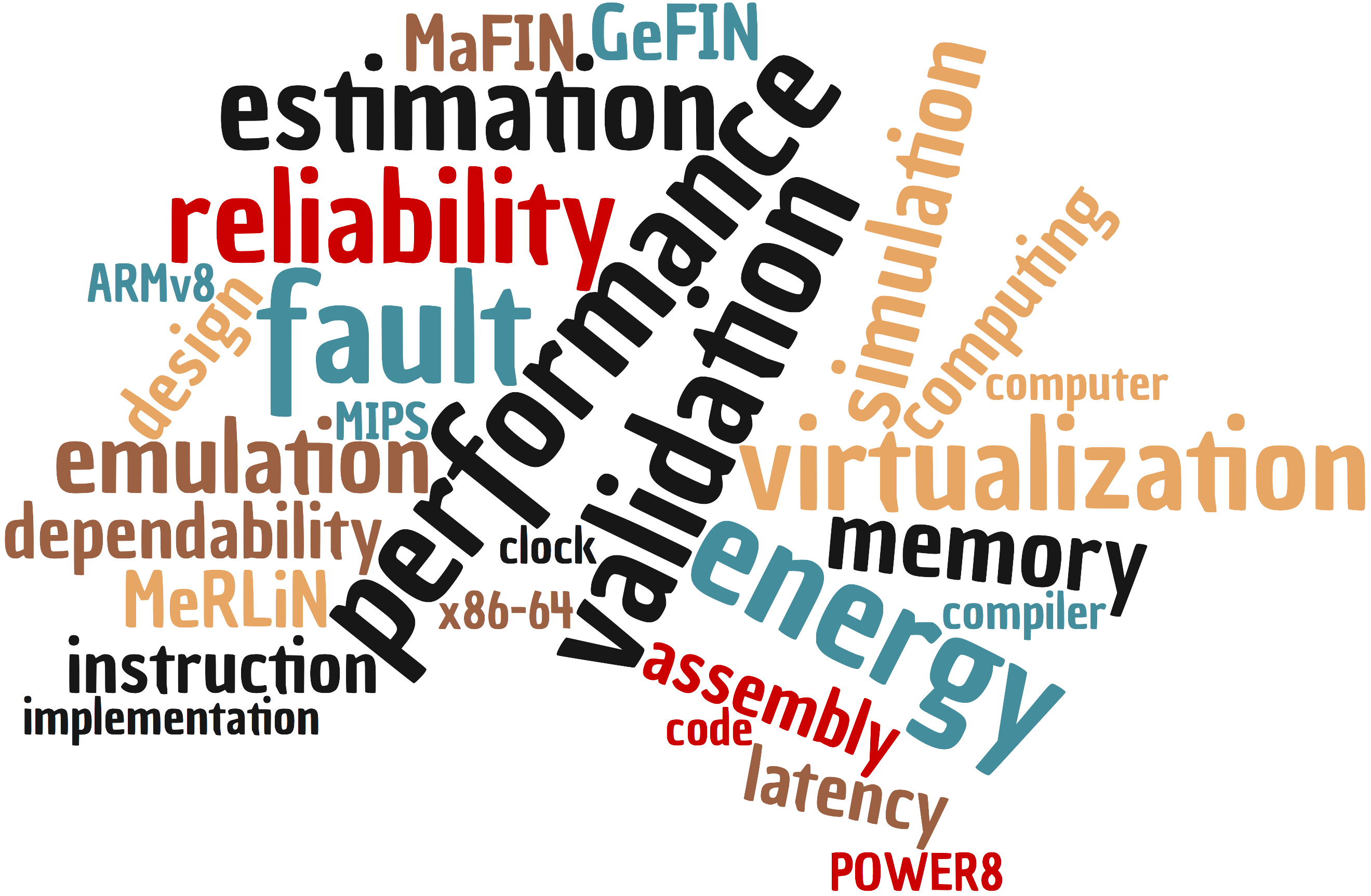Computer Architecture Lab
Department of Informatics & Telecomm. @ University of Athens




 Recently accepted Lab's papers: IEEE Micro Magazine 2026 (x2), IEEE/ACM DATE 2026, IEEE Computer Magazine 2025, IEEE IISWC 2025, IEEE ITC 2025, IEEE HPCA 2025 and IEEE/ACM DATE 2025!
Recently accepted Lab's papers: IEEE Micro Magazine 2026 (x2), IEEE/ACM DATE 2026, IEEE Computer Magazine 2025, IEEE IISWC 2025, IEEE ITC 2025, IEEE HPCA 2025 and IEEE/ACM DATE 2025!O. Chatzopoulos, M. Trakosa, H. Dixit, S. Sankar, D. Gizopoulos, “Phoebe: Measuring the Unmeasurable - Demystifying Silent Data Corruptions in AI Accelerators through Microarchitectural Modeling”, IEEE Micro Magazine (IEEE Micro 2026), January-February 2026. N. Karystinos, O. Chatzopoulos, G.-M.Fragkoulis, D. Gizopoulos, S. Gurumurthi, “Harpocrates++: Automated Functional Programs Generation against CPU Faults and Silent Data Corruptions”, IEEE Micro Magazine (IEEE Micro 2026), January-February 2026. G.-A. Kostas, D. Gizopoulos, V. Karakostas, “Colored Huge Pages: A Harware-Software Approach for Enhanced Isolation and Performance”, IEEE/ACM Design, Automation, and Test in Europe Conference (DATE 2026), Verona, Italy, April 2026. D. Gizopoulos, “The Dark Side of Computing: Silent Data Corruptions”, IEEE Computer Magazine (IEEE Computer 2025), June 2025. G.-M. Fragkoulis, D. Gizopoulos, “vACE: Exploring the Design Space of Vector Processing Units for Soft Error Vulnerability”, IEEE International Symposium on Workload Characterization (IISWC 2025), Irvine, CA, USA, October 2025. A. Nezhadi, O. Chatzopoulos, M. Mayahinia, G. Papadimitriou, M. Tahoori, D. Gizopoulos, “Sisyphus: Cross-Layer Efficiency Across NVM Technologies in Compute-in-Memory Architectures”, IEEE International Test Conference (ITC 2025), San Diego, CA, USA, September 2025. O. Chatzopoulos, Nikos Karystinos, G. Papadimitriou, D. Gizopoulos, H. D. Dixit, and S. Sankar, “Veritas: Demystifying Silent Data Corruptions: μArch-Level Modeling and Fleet Data of Modern x86 CPUs”, IEEE International Symposium on High-Performance Computer Architecture (HPCA 2025), Las Vegas, NV, USA, March 2025. O. Chatzopoulos, G. Papadimitriou, D. Gizopoulos, H. D. Dixit, and S. Sankar, “From Gates to SDCs: Understanding Fault Propagation Through the Compute Stack”, Design, Automation, and Test in Europe (DATE 2025), Lyon, France, March 2025.

CAL team works on different aspects of Computer Architecture and Computer Systems. We deal with computing systems built around general-purpose and specialized CPUs, memory systems, and accelerators such as GPUs and AI Accelerators (AIAs). We care about the complex interactions among different parameters including performance, power/energy and dependability/reliability. We deliver methods and tools for fast evaluation of reliability, for energy-efficient computing, for error detection and recovery, as well as for silicon debug and validation.
Our research is generously supported by the European Union (Horizon Europe, Chips JU, EuroHPC JU,KDT JU, Horizon 2020, FP7 frameworks) and the National Government (HFRI, GSRI) as well as by leading companies of the computing industry (AMD, Meta, Intel, IBM, ABB, Bosch) and the Open Compute Project (OCP) industry consortium. The lab prouly participates in several National and European research projects and Networks of Excellence.
We design mechanisms for improving the performance of computing systems, focusing on emerging application domains that stress the limits of the memory system and its impact on execution. Our hardware, software, and co-design approach involves all the layers of the computing stack, from the application, the runtime and the OS, to the architecture and microarchitecture layers.
We devise models, methods and tools for CPUs and memories silicon debug and validation aiming to detect and locate hard-to-detect design bugs that escape pre-silicon, simulation-based verification. Our methods aim to improve the coverage of the silicon debug process (and thus its bug detection capability) while reducing significantly the time of the process.
We deliver methods and tools for the evaluation of computing systems reliability for different types of models (transients or permanents) and for all major hardware components including CPUs, GPUs and memories. The main focus is on the speed of the reliability evaluation and its accuracy. We work at the microarchitecture level, the software level and the RT level.
We investigate the margins of modern computing systems hardware to reveal the potential of energy and power savings when they operate beyond nominal conditions of voltage, frequency and refresh rates. We characterize the variation among different chips, different cores within chips and different workloads regarding their design margins, aiming to predict safe and energy-efficient operation points of modern hardware.
We design hardware-based and software-based methods for the detection and tolerance of transient and permanent faults in the hardware components of computing systems. We provide solutions for CPUs, GPUs and memories. The main focus is the error coverage of the methods as well as the minimization of their cost in terms of system performance, energy/power and hardware area.